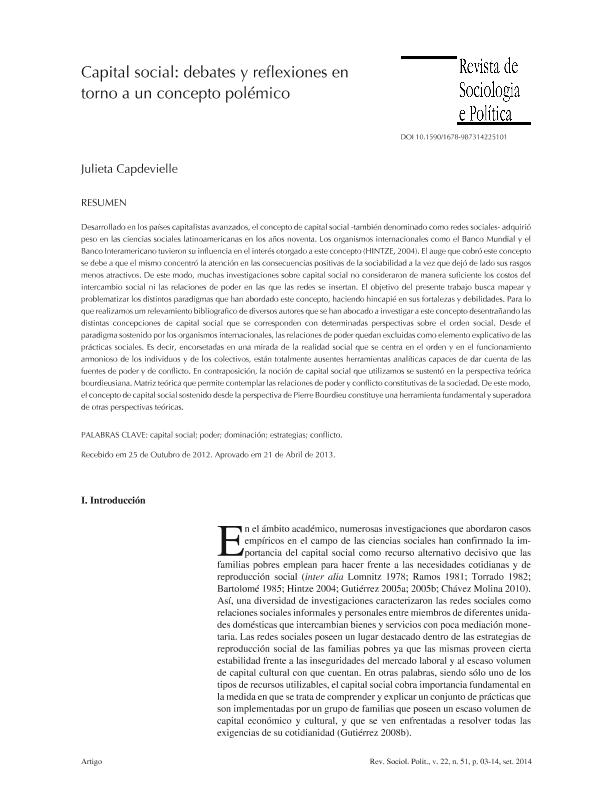Mostrar el registro sencillo del ítem
dc.contributor.author
Capdevielle, Julieta María

dc.date.available
2016-12-07T21:23:59Z
dc.date.issued
2014-12
dc.identifier.citation
Capdevielle, Julieta María; Capital social: debates y reflexiones en torno a un concepto polémico; Revista de Sociologia e Política; 22; 51; 12-2014; 3-14
dc.identifier.issn
0104-4478
dc.identifier.uri
http://hdl.handle.net/11336/9062
dc.description.abstract
Desarrollado en los países capitalistas avanzados, el concepto de capital social -también denominado como redes sociales- toma peso en las ciencias sociales latinoamericanas en los años noventa. Los organismos internacionales como el Banco Mundial y el Banco Interamericano tuvieron su influencia en el interés otorgado a este concepto (Hintze, 2004). Desde el paradigma sostenido por estos organismos el concepto de capital social se volvía fructífero en tanto que el mismo iluminaba las posibilidades de una sociedad autoorganizada y autorregulada para resolver las fallas del mercado sin necesidad de una intervención estatal (Hintze, 2004, 148). Así, el impulso que cobró este concepto se debe a que el mismo concentró la atención en las consecuencias positivas de la sociabilidad a la vez que deja de lado sus rasgos menos atractivos. Cabe aclarar como crítica a muchas de estas investigaciones sobre capital social en que en las mismas no se consideran de manera suficiente los costos del intercambio social ni las relaciones de poder en las que las redes se insertan. El presente trabajo busca mapear y problematizar los distintos paradigmas que han abordado este concepto, haciendo hincapié en sus fortalezas y debilidades.
dc.description.abstract
Developed in the advanced capitalist countries, the concept of social capital, also known as social media weight-acquired Latin American social sciences in the nineties. International agencies like the World Bank and the Inter played a role in the interest given to this concept (Hintze 2004). The boom that took this concept is that it focused attention on the positive consequences of sociability while aside its less attractive features. Thus, much research on social capital is not sufficiently considered the costs of social exchange and power relations in which the networks are inserted. The aim of this paper to map out and problematize the different paradigms that have addressed this concept, emphasizing their strengths and weaknesses. To what do um bibliographical survey of several authors who have focused on investigating this concept unraveling the different conceptions of social capital that correspond to certain perspectives on the social order. Since the paradigm supported by international organizations, the power relations are excluded as an explanation of social practices. I mean, look corseted in a social reality that focuses on order and the smooth functioning of individuals and groups, are totally absent analytical tools capable of accounting for the sources of power and conflict. In contrast, the notion of social capital we used was based on the theoretical perspective bourdieusiana. Theoretical matrix that allows us to contemplate the power relations and conflict constitutive of society. Thus, the concept of sustained capital from the perspective of Pierre Bourdieu is a fundamental tool overcomes other theoretical perspectives.
dc.format
application/pdf
dc.language.iso
spa
dc.rights
info:eu-repo/semantics/openAccess
dc.rights.uri
https://creativecommons.org/licenses/by-nc-sa/2.5/ar/
dc.subject
Capital Social
dc.subject
Paradigmas
dc.subject
Desigualdad
dc.subject
Lucha
dc.subject.classification
Tópicos Sociales

dc.subject.classification
Sociología

dc.subject.classification
CIENCIAS SOCIALES

dc.title
Capital social: debates y reflexiones en torno a un concepto polémico
dc.type
info:eu-repo/semantics/article
dc.type
info:ar-repo/semantics/artículo
dc.type
info:eu-repo/semantics/publishedVersion
dc.date.updated
2016-12-07T18:00:20Z
dc.identifier.eissn
1678-9873
dc.journal.volume
22
dc.journal.number
51
dc.journal.pagination
3-14
dc.journal.pais
Brasil

dc.journal.ciudad
Curitiba
dc.description.fil
Fil: Capdevielle, Julieta María. Universidad Nacional de Cordoba. Facultad de Filosofia y Humanidades. Centro de Investigaciones; Argentina. Consejo Nacional de Investigaciones Científicas y Técnicas. Centro Científico Tecnológico Córdoba. Instituto de Humanidades; Argentina
dc.journal.title
Revista de Sociologia e Política
dc.relation.alternativeid
info:eu-repo/semantics/altIdentifier/url/http://www.scielo.br/revistas/rsocp/paboutj.htm
Archivos asociados
